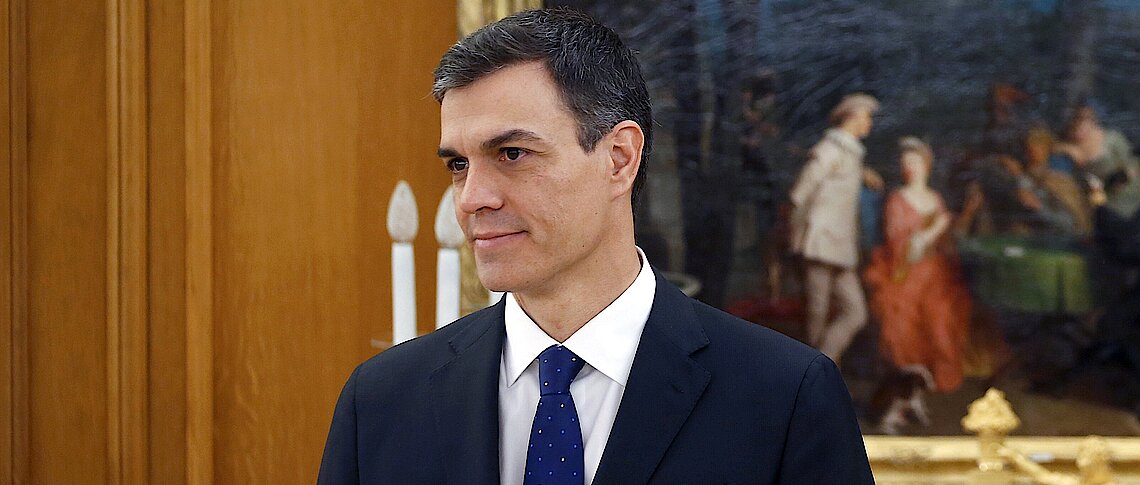Read this article in German.
A vote of no confidence has been passed against Spanish conservative prime minister Mariano Rajoy, making social democrat Pedro Sánchez the country’s surprise new head of government. What happened exactly?
Conservative Spanish prime minister Mariano Rajoy of the Partido Popular (PP) has been in power since 2011, most recently heading a minority government. He stubbornly and stoically saw off many crises during his term. In the past few months, though, he even lost the backing of his own party following low approval ratings, having acted on the issue of Catalonia without any view to a solution and notably remaining silent on the new corruption scandals within the PP which he had been helplessly faced with.
With 180 votes to 169, an anti-Rajoy coalition took power on 1 June 2018, installing social democrat Pedro Sánchez as the new Spanish head of government. This marks the first time that a vote of no confidence has been passed since Spain’s return to democracy in 1977. On the following Saturday, the King officially appointed Sánchez as prime minister.
Who is the new prime minister Pedro Sánchez?
The 46-year-old economist began his political career in 2000, serving as an advisor to the regional government of Madrid, before working directly for then-prime minister José Zapatero. In 2014, he was elected Secretary-General of the Spanish Socialist Workers’ Party (PSOE), but was forced to resign by the majority of his own MPs and the PSOE regional chiefs after losing two elections and failing twice to form a government in autumn 2016. Then came his comeback. In May 2017, he returned to the top of the party following a member vote, this time with a more grassroots and left-wing stance. Now, suddenly, he has become the third social democrat to head the Spanish government.
What are the biggest hurdles that the new government will face? How much room for maneuvering does the new coalition have?
The prospect of a rainbow anti-Rajoy coalition offering a stable government until the end of this parliament in June 2020 is a tall order. The left-wing populist party Podemos declared that the days of a single-party government in Spain are over, especially since the socialists have just 84 seats in parliament. They are expecting an invitation to form a coalition government as a progressive alliance, otherwise they will be sitting in opposition.
Together with the PSOE, they would have 155 seats, more than the previous PP minority government, but still reliant on the regional parties to make up a majority of 176. They can forget having the support of the liberal Ciudadanos party, whose leader Albert Rivera is polling highly and calling for early elections, even vying for the position of prime minister himself.
Will Sánchez set a new course on the issue of Catalonian independence?
Sánchez has attempted to get the Catalans on side with his promise to open a new dialogue. He promised a government founded in democracy, but also made it clear that splitting from Spain is out of the question. The conservative PP and liberal Ciudadanos will be watching the situation like a hawk to make sure that the new left-wing government does not give too many concessions to the separatist regional government in Barcelona.
Last year, in the Spanish parliament, the PP accepted the PSOE’s demands to establish a committee to carry out financial and institutional reforms to the country’s decentralised structure. But so far it has been reluctant to implement the committee’s work. Both the PP and Ciudadanos are expected to block anything until new elections are held.
What will change regarding social policies?
The possibilities remain rather limited for more far-reaching initiatives. Sánchez has announced that he wants to work with the budget adopted by his predecessor, something which he had to promise to Basque nationalists to avoid a push for a new budget in parliament.
Those further to the left in his party, as well as Podemos, would like to press for more social policies. For the two trade union confederations – the UGT and CCOO – a review of the conservatives’ employment law reform adopted in 2012 is high up on the list of priorities.
So too is the issue of pensions, with large parts of the population uncertain about their future. According to the latest opinion poll carried out by state polling institute CIS in April 2018, pensions are now the second most important issue for Spaniards at 15.5%, after unemployment at 65.9%.
The interview was conducted by Hannes Alpen.






